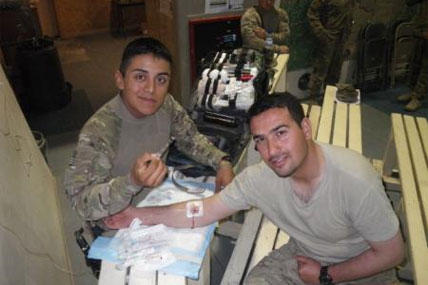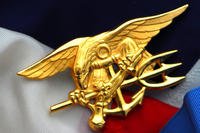CHULA VISTA, Calif. - U.S. Army medics are trained in the art of saving lives. Their skills are vital on the battlefield, but can come in handy here at home, as Spc. Leonardo Becerra of the California Army National Guard’s 670th Military Police Company proved early one morning in March.
Becerra, who deployed as a medic to Afghanistan in 2011-12 with the 756th Transportation Company, is currently studying to be a physician’s assistant at Grossmont College in El Cajon, Calif., while drilling with the 670th in National City.
At 1 a.m. on March 11, he was studying with his girlfriend in his Chula Vista apartment when they heard someone outside yelling for help.
“We heard cries of pain,” Becerra said. “I thought someone was being raped. I felt it was our job to go out and scare the guy away.”
Becerra told his girlfriend to be ready to call 911 and went outside to investigate. He found a naked, 21-year-old woman covered in blood lying on the pavement in the apartment complex parking lot. The woman was moaning and rolling from side to side in pain. Blood was pooling on both sides of her.
She cried out that she had been stabbed. A large, bloody kitchen knife lay on the pavement next to her.
The woman’s boyfriend had apparently stabbed her after an argument and fled.
Becerra’s training kicked in. “I immediately started thinking about what to do for a stab wound,” he said.
He assessed the woman’s injuries and found that she had a minor stab wound to the stomach and a more serious wound in her chest where the knife had penetrated her lung.
Becerra ran back into his apartment and grabbed his medic bag while rattling off the nature of the victim’s injuries to his girlfriend who called 9-1-1.
He ran back outside with his bag. “Luckily for you, I’m a medic in the U.S. Army,” he told the victim.
He went into the bag’s trauma section and pulled out the combat gauze.
“As soon as she removed her hand from the wound, blood squirted out from her chest,” he said. “That’s when I realized that I really needed to stop the bleeding.”
No one else had come out from their apartments except one woman in a bathrobe who peeked around a corner. Becerra said he felt vulnerable to attack as he was only wearing boxer shorts and had no idea where the perpetrator could be.
His girlfriend called out saying that the 911 dispatcher had said not to touch the victim. But Becerra knew from his training that he had to get the victim’s bleeding under control or she could die.
He lifted the lip of the wound and saw that the blade had done a lot of damage. He stuffed gauze into the cavity to prevent the woman’s lungs from filling with blood. He kept his hand on the gauze to staunch the bleeding.
“She told me it hurts, but I said, ‘I don’t care. I’m not going to let you die on me.’”
A police car arrived and an officer approached to find Becerra in his boxer shorts kneeling over a naked woman with blood on his hands and forearms. But Becerra was able to convince the officer that he was an Army medic and was trying to help. They then started assisting the victim together.
Becerra answered questions from an investigator and went back to the victim and talked to her until paramedics arrived. The paramedics quickly loaded her onto a litter and took her away in an ambulance.
“I just stepped back and thought, ‘What just happened?’” Becerra said.
A television news crew from NBC 7 San Diego was on the scene and asked for an interview. Becerra went into his apartment, washed off the blood and put on his Army physical fitness shorts. Then, shirtless with his medic bag slung over his shoulder, he gave an interview to the reporter.
Soldiers with the 670th saw him on the news and posted the video to the unit’s Facebook page.
A few days later, the victim’s mother knocked on Becerra’s door. She told him without emotion that a part of her daughter’s lungs had to be removed. The doctor had told her to say thank you to the Army medic because blood and air had been entering her daughter’s lungs. Becerra’s intervention had slowed the bleeding and saved her daughter’s life.
The victim’s mother broke down and started crying. She gave Becerra a hug, squeezing him tightly.
Becerra’s company commander, 1st Lt. James Stanfield, said he was impressed when he heard what Becerra had done.
“He’s a very competent, knowledgeable medic,” Stanfield said. “I think what he did definitely gives me strong confidence knowing that he can take the proper actions to save lives in a high stress environment.”



























